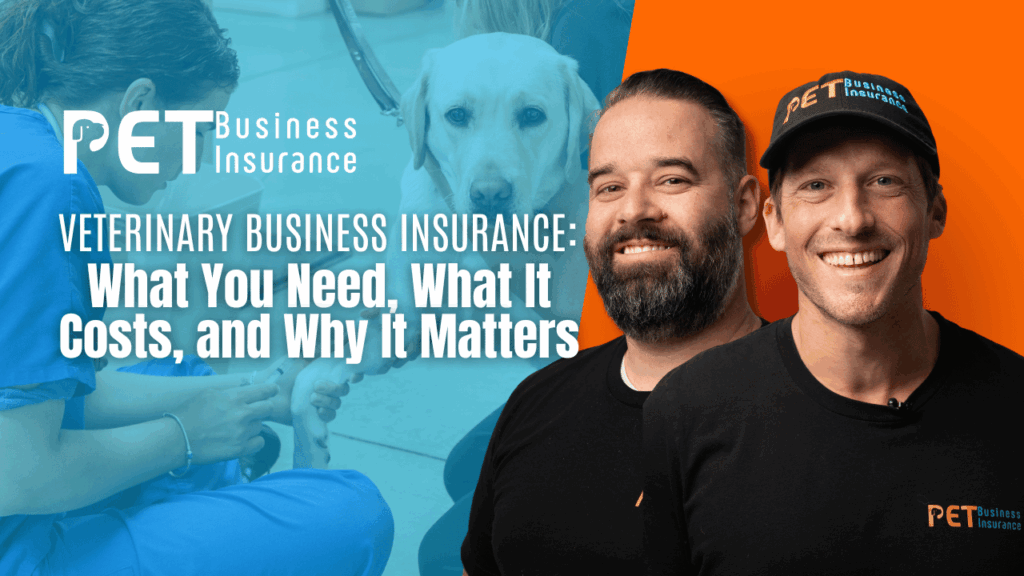
A Real-World Wake-Up Call
What if a pet is injured during a routine exam at your clinic?
What if a client sues for malpractice—even when you followed every protocol?
Veterinary professionals like you carry enormous responsibility. You’re not just caring for animals—you’re managing staff, handling medications, storing sensitive data, and keeping your business running smoothly. One unexpected event could jeopardize your license, your reputation, or your entire practice.
That’s why we created this guide—to help you understand what types of insurance veterinary clinics typically need, what they cost, and how to protect the business you’ve worked so hard to build.
Why Veterinarians Need Specialized Business Insurance
Veterinary clinics face a unique mix of risks that go far beyond what standard business policies cover:
- Medical liability: A pet suffers complications after surgery, and the owner files a claim.
- Onsite accidents: A client trips in your lobby, or a dog bites your technician.
- Theft or spoilage: Expensive medications or vaccines are stolen or damaged.
- Cyber threats: Patient data or payment systems are hacked.
- Employee injuries: Animal handling leads to bites, strains, or surgical mishaps.
Veterinary-specific insurance policies are designed to protect against these kinds of real-world risks—so you can stay focused on patient care.
Key Insurance Policies for Veterinary Clinics
1. Business Property Insurance
Covers physical damage to your clinic’s assets—like exam tables, x-ray machines, and medical storage—from risks such as fire, theft, or weather events. Helps ensure continuity with repairs or replacements.
2. Business Income Insurance
Helps replace lost income if your clinic is unable to operate due to covered damages to your property or equipment. This coverage ensures you can continue to pay expenses like rent and employee wages during downtime.
3. General Liability Insurance
Protects against everyday accidents like slips, falls, or pet altercations on your premises. Estimated cost: $40–$75/month
4. Business Owner’s Policy (BOP)
Combines property and liability coverage. It typically protects your clinic’s building, equipment, medications, and includes business interruption coverage.
Estimated cost: $80–$150/month
5. Workers’ Compensation
Required in most states. Covers employee injuries, whether it’s a scratch from a frightened cat or a back strain from lifting.
Estimated cost: $0.75–$2.50 per $100 in payroll
6. Animal Bailee Insurance
Provides protection if a pet in your care is injured, escapes, or dies due to fire, theft, or other covered incidents.
7. Commercial Auto Insurance
Important if you operate a mobile clinic or use vehicles for pet transport or supply runs.
Cost Overview for a Small Veterinary Clinic
| Coverage Type | Monthly Estimate |
| General Liability | $40–$75 |
| Business Owner’s Policy (BOP) | $80–$150 |
| Business Property Insurance | Typically included in BOP |
| Business Income Insurance | Often included in BOP or $30–$70 if separate |
| Workers’ Compensation | Varies by state/payroll |
| Animal Bailee Insurance | $15–$30 (varies based on volume and services) |
| Commercial Auto Insurance | $50–$100 (depending on vehicle use) |
Estimated Monthly Premium: $180–$425 for a solo or small practice
How to Choose the Right Provider
- Look for experience in vet practices: Some providers specialize in medical and pet-related businesses.
- Read the exclusions: Make sure procedures, emergencies, and unique services (like care for exotic animals) are covered.
- Ask about extras: Look into endorsements for telemedicine, euthanasia, or emergency services.
- Check reviews: See what other clinic owners say about the provider’s support and claims process.
Veterinary Business Insurance FAQs
What’s legally required?
Workers’ compensation is required in most states. If you drive for business purposes, commercial auto coverage is typically needed too.
Can new clinics get insured?
Absolutely. Many providers have starter packages designed for new veterinary practices.
What does animal bailee insurance cover?
It protects pets in your care if they’re hurt, lost, or killed due to covered events like theft or fire.
Final Thoughts
Running a veterinary clinic is demanding—and full of unpredictable moments. But having the right protection in place gives you the freedom to focus on what matters most: the animals and people who rely on you every day.
If you’re unsure where to start, now’s the perfect time to review your current protection and make sure it truly fits your practice.
Pet Business Insurance is here to help guide veterinary professionals toward solutions that match their reality—not just their risk. Let’s keep your business, your team, and your clients safe—together.

